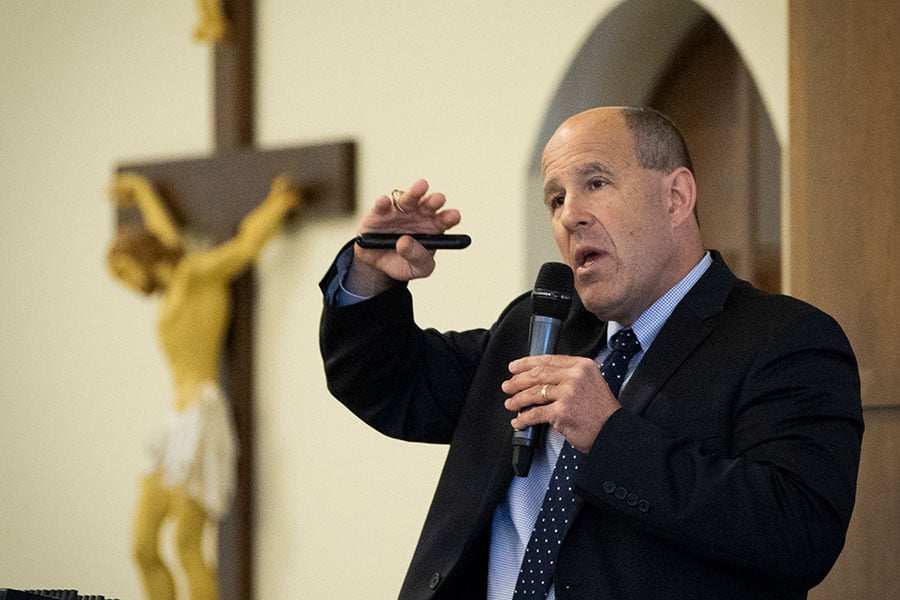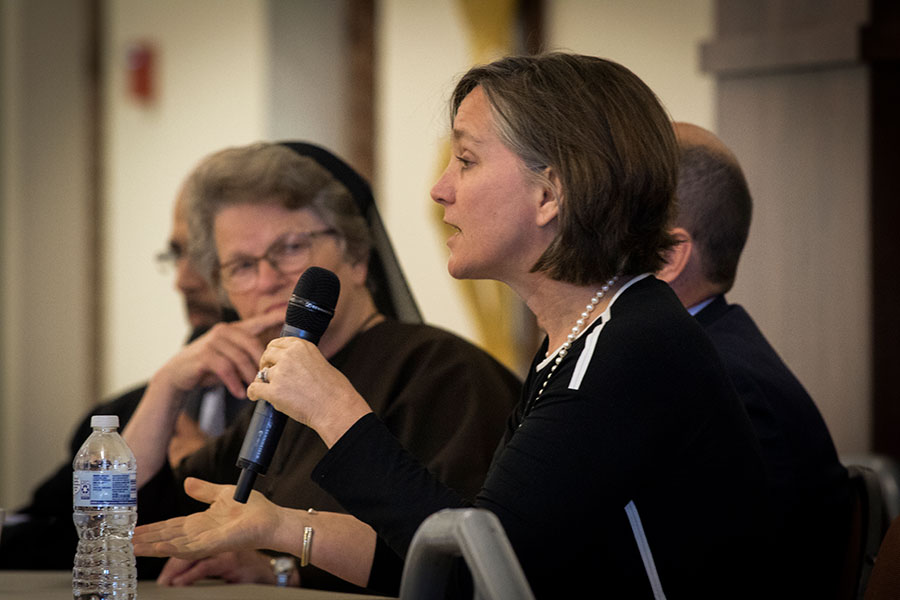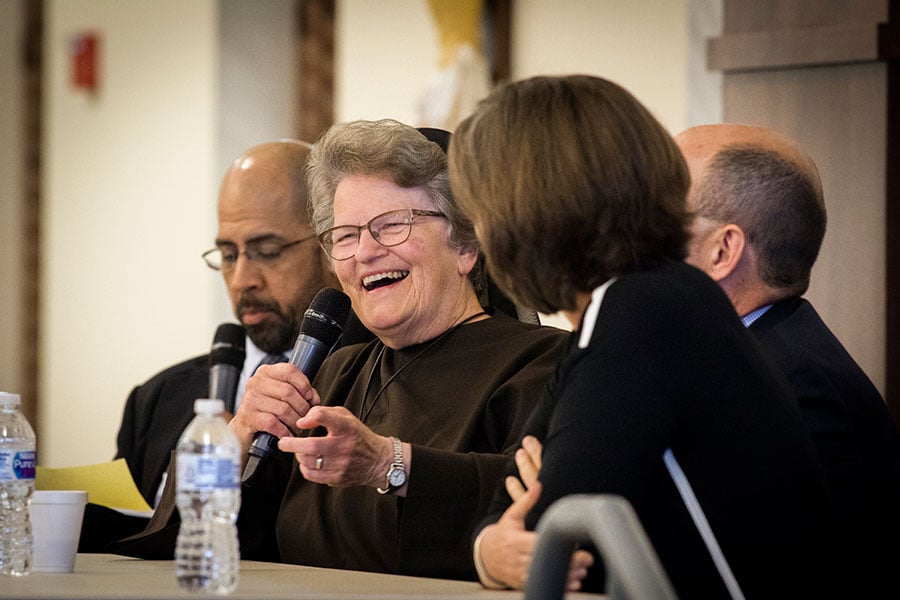End-of-life experts agree: plan and love to the finish

Dr. John Brehany, Ph.D., STL, speaks at the End-of-Life Conference hosted by the Diocese of Fort Worth Respect Life Office at St. Bartholomew Parish on Saturday, April 27, 2019. (NTC/Rodger Mallison)
FORT WORTH — Everybody get ready. Dying is the most important process in our lives, and it’s a disservice to put off planning for death, asserted Sister Suzanne Gross, FSE, who has served as the administrator of Franciscan Home Care and Hospice Care in Meriden, Conn. since 1987.
In addition to spiritual concerns voiced by Sr. Suzanne, the end of life has bioethical and legal ramifications. That’s why the Diocese of Fort Worth hosted a bioethics and end-of-life conference addressing ultimate issues with Sr. Suzanne, bioethicist John Brehany, Ph.D, S.T.D., and Dallas lawyer Ellen Eisenlohr Dorn.
The conference addressed the “inherent responsibility as disciples of Christ to profess the dignity of the human person and the sanctity of life,” said Marlon De La Torre, diocesan director of evangelization and catechesis. The diocese plans to host conferences annually to increase understanding about Church teaching on pro-life matters.
What is bioethics?
Although the term was coined in 1971, bioethics is an ancient field. Dr. Brehany, the director of institutional relations for the National Catholic Bioethics Center, cited the book of Acts, the writings of St. Augustine, and the Hippocratic Oath as evidence of our forebears grappling with euthanasia and suicide.
“All the old issues remain, they are just complicated with new tools,” said the former executive director and ethicist of the Catholic Medical Association.
Medical technology has advanced since the Church’s Declaration on Euthanasia in 1980 or St. John Paul II’s Evangelium Vitae (“The Gospel of Life”) in 1995, but we possess the “deep resources of the Church to analyze and address the full range of issues,” Dr. Brehany said.
Those resources include Sacred Scripture, tradition, and the magisterium.
For example, in 1540, Dominican theologian Francisco de Vitoria distinguished between ordinary means and extraordinary measures to prolong life, a concept still at the heart of discussions of end-of-life care.
The Church teaches that life comes from God and is good, so we must use ordinary means to preserve life. However, we may forgo extraordinary treatments if it places an excessive burden on the patient or offers no reasonable hope of improvement.
As death nears, we must sort through the issues of medical care, apply Church principles, and make a decision, Dr. Brehany explained.
The decision is not always clear cut. For example, pacemakers and medically assisted nutrition are usually considered ordinary means of care, which would be necessary interventions, according to the Church. But in certain circumstances those interventions may merely prolong death or cause significant discomfort. A careful examination of intent is helpful, and the bioethicist said his nonprofit offers free consultations to individuals and institutions to assist in judgment.
Like Sr. Suzanne, Dr. Brehany encourages Catholics to be informed ahead of time, stating, “We should have a vision of the human condition and a plan for care that is fundamentally formed by faith.”
Although the technology is complex and the choices may seem confusing, the rich teachings of the Church provide a strong framework. Catholic bioethics is “ultimately about two words: life and love,” he summarized.
Where law and life meet

Medical technology advances, and the legal code regarding end-of-life issues evolves too.
The 86th Texas Legislative Session is currently underway. Bills regarding palliative care, futile care, and other end-of-life statutes are under consideration.
Dorn, who serves as vice president of the Catholic Bar Association, promised the 70 attendees a “nuts-and-bolts” discussion of the legal issues concerning end of life.
She explained the Advanced Directives (living will) document, in which a patient states his preferences for treatment when a condition is terminal or irreversible, offers two stark choices and contains vague language. The Texas legislature has approved a model form, but “their check-the-box form is not nuanced, but Catholic teaching is nuanced,” she explained.
Furthermore, having a medical power of attorney — an advocate to make medical decisions when the patient is unable to communicate — is “absolutely important,” she said. But she recommends that Catholics modify the form to request that care is given according to the teachings of the Catholic Church.
In addition to the Advanced Directive form, the Texas legislature has a template for Medical Power of Attorney. As a past president of the St. Thomas More Society in Dallas, Dorn helped craft Catholic versions of the two documents that comply with both Catholic teaching and Texas law. The forms are available on their website, stmsdallas.org.
Dorn said the Church is pro-life, not anti-death, recognizing that death is the pathway to eternal life with our Creator. Therefore, the Church encourages the faithful to plan for their death.
Why do we suffer?

Sr. Suzanne wishes she had more time with her patients. The average duration of hospice care in her agency is 20 days, and the caregivers have “so much to do to get them ready to meet God face-to-face,” she pointed out.
Enhancing a patient’s quality of life is a priority for palliative and hospice care, although the Connecticut sister explained that “quality of life” might mean getting a patient back to the sacraments, not back to the golf course.
Lying in a hospital bed in their own living room “doesn’t change the value of your life, just what God’s asking of you,” she explains to her patients.
Patient suffering and co-suffering (suffering by those who care about the patient) are ever-present near the end of life. She used examples of clients from her 30 years’ experience in hospice administration, quotes from the magisterium, and even cartoons to explain the meaning of suffering.
Suffering is not the same as pain, the Franciscan Sister of the Eucharist contended. Pain is to be managed, whereas suffering should be embraced. Suffering, as evidenced by childbirth and Jesus’ crucifixion, brings life and new growth.
As an example, she shared a story of a husband who said that without the experience of walking with his wife through death, he wouldn’t have learned how to be a husband, how to be a caregiver, and how much he loved her.
The ultimate example of suffering and co-suffering is Jesus’ death on the cross and Mary’s remaining with Him at the foot of the cross.
How we manage suffering is a measure of our society, Sr. Suzanne said. She quoted Pope Benedict XVI, “A society unable to accept its suffering members and incapable of helping to share their suffering and to bear it inwardly through compassion is a cruel and inhuman society.”
Sr. Suzanne shared with the attendees truths she’s learned in working with hospice patients: life is eternal, love is immortal, and God gives us grace and strength.
